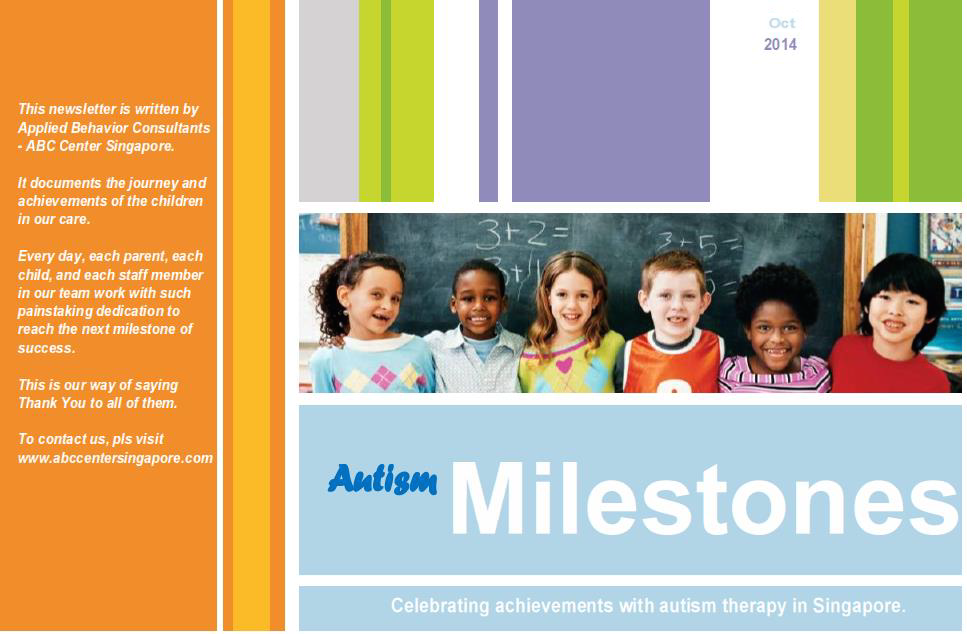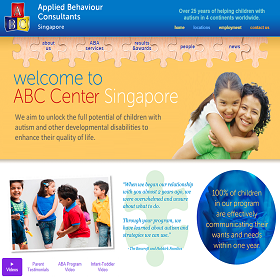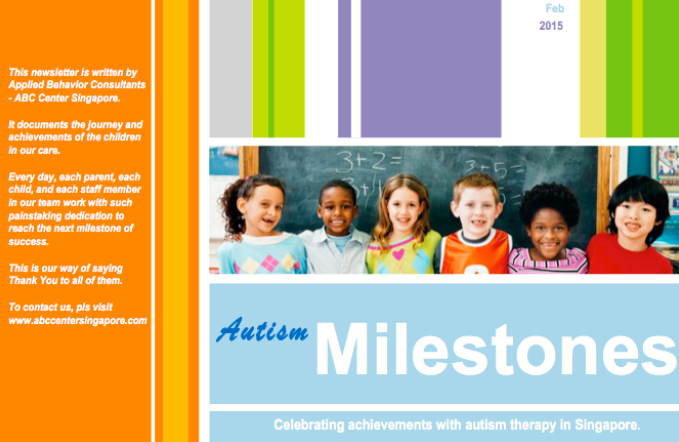
This month, we speak with Director and Co-Founder of ABC Center Singapore and Philippines, Ms. Beth Tan, about her dreams for ABC Center’s children, as well as her own journey as a mother of a child with autism. Ms. Tan is a U.S. licensed music and movement teacher with years of experience in teaching children, especially toddlers and pre-school aged children. With her at the helm, ABC Center Singapore has articulated its core value of ‘The needs of the child should always come first!’.
Besides being Director of ABC Center, you are first and foremost, a mother of a child with autism. How did your own journey start? Just like any mother, I was incredibly happy when I first had my baby. She uttered some words like ‘baby’, ‘bear’, ‘mama’ when she was 11 months old. However, after a few months, I noticed she stopped saying these words. She would not turn when I called her name but would rather look towards the television, especially if advertisements were played. I always had a gut feel that my child was delayed and would need help.
Can you describe how you felt when you were first told about the condition of your child? I felt that the whole world crashed. As a parent, you always have great dreams and hopes for your child. Getting this news made my head spin. I felt helpless and vulnerable too.
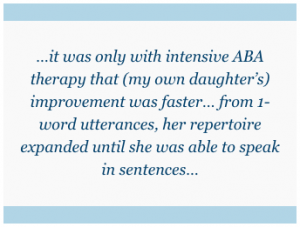 How did you cope with it? Who helped you? It was very difficult at first. Even looking for competent people to help my daughter was a struggle. My husband and our families were quite supportive in looking for the right intervention. At that time, there were limited choices here in Asia. There are some very good therapists but they were very hard to find. I was happy to have eventually found them. At the same time, I also had to go to the USA to find someone to direct and coordinate the entire program for my child.
How did you cope with it? Who helped you? It was very difficult at first. Even looking for competent people to help my daughter was a struggle. My husband and our families were quite supportive in looking for the right intervention. At that time, there were limited choices here in Asia. There are some very good therapists but they were very hard to find. I was happy to have eventually found them. At the same time, I also had to go to the USA to find someone to direct and coordinate the entire program for my child.
How did your child progress? How did ABA therapy help? I had her see a Special Education teacher even before her diagnosis. I did not wait for the diagnosis because I knew it was important to start the therapy as soon as possible. I saw some improvement. However, it was only with intensive ABA therapy that her improvement was faster. She started responding when you called her. She started having eye contact. From 1 word utterences, her repertoire expanded until she was able to speak in sentences. She became more aware of her surroundings and was able to request for what she needed. She was able to play appropriately with toys and play with her sisters and friends. She moved from someone caught up in her own world to someone you can interact and chat with.
I suppose this experience with your daughter prompted you to help other children with autism? It was always my dream to help children with special needs. There always was a strong urge to reach out to them, even when I started teaching. They have a special place in my heart. My very good friend (Director and Co-Founder of ABC Center Singapore and Philippines, Christine Angco) also had a calling to give back to the world and to its special children. From there, everything fell into place. We had an opportunity to meet Dr. Joseph Morrow, Phd, BCBA-D (Co-Founder of Applied Behavior Consultants, USA) and the plan to set up in Asia came about.
You specifically chose the ABA technique because of how well it worked for your daughter? Yes. I realized there was a need to give really good programs here in Asia. Applied Behavior Analysis (ABA) is the most clinically proven help for children with autism. There are many other programs that claim to help, but I personally think it is a risk for parents to be using programs without peer-reviewed clinical studies published in the leading scientific journals.
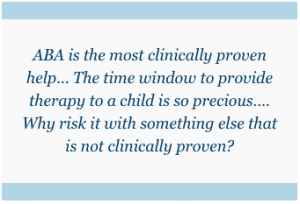 Some have limited data not robust enough to be considered a clinical study, or others only have limited testimonies/ anecdotes. In contrast, because of the large body of scientific data supporting ABA, the US Surgeon General has recognized its effectivity to help children with autism.
Some have limited data not robust enough to be considered a clinical study, or others only have limited testimonies/ anecdotes. In contrast, because of the large body of scientific data supporting ABA, the US Surgeon General has recognized its effectivity to help children with autism.
The time window to provide therapy to a child is so precious, you want to maximize the opportunity with the best available program….why risk it with something that is not clinically proven?
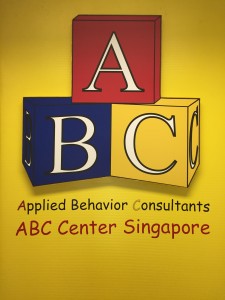 There are many providers of ABA, why did you specifically choose Applied Behavior Consultants, Inc, as the one to bring to Asia? Applied Behavior Consultants, Inc stands out in many ways. Dr Joseph Morrow, Phd, BCBA-D, one of the founders, is one of the pioneers in the field of behavior therapy in the world. He and Brenda Terzich-Garland (Co-Founder and Chief Clinical Officer) are extremely hands-on with their operations globally. They monitor the progress of our children and staff members even if they are living in the other side of the world! It is so impressive how they do this.
There are many providers of ABA, why did you specifically choose Applied Behavior Consultants, Inc, as the one to bring to Asia? Applied Behavior Consultants, Inc stands out in many ways. Dr Joseph Morrow, Phd, BCBA-D, one of the founders, is one of the pioneers in the field of behavior therapy in the world. He and Brenda Terzich-Garland (Co-Founder and Chief Clinical Officer) are extremely hands-on with their operations globally. They monitor the progress of our children and staff members even if they are living in the other side of the world! It is so impressive how they do this.
Clinically, the way Applied Behavior Consultants applies ABA is really cutting-edge. For example, generalization (quickly ensuring that whatever is learned at the table during therapy session is also learned in a natural setting) is a big focus. This is done via REAL (Recreating Environments to Accelerate Learning), which was created by Brenda Terzich-Garland. This is reflected even in the way we set up our classrooms (you will see it is different from other therapy centers). It is reflected in the way we schedule the children’s sessions and the therapists they work with. There is a focus on making the setting as natural as possible so that the child learns faster.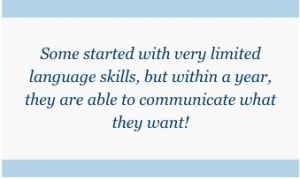
Do the parents see a difference in the way you do ABA? Many parents tell me they are even surprised with the way we gather data about their children. It is at such a high level, many say it is beyond what they have seen in others. And of course, they see the results in the progress of their children. I have seen so many excellent graphs of our children’s learning and actual acquisition rates. This consistency in result must come from the high quality of the technique that Applied Behavior Consultants uses globally.
How do you think ABC has helped children? ABC has helped children in so many ways. Our results show that 100% of children make progress. Each child is different, with different needs, strengths and interests. From ABC’s thorough assessment, we are able to set a baseline and move from there.
Can you share specific examples? The simple need for a child to communicate what he wants is one of the most important things we do. I am happy that we are able to do this well. Being able to communicate lessens the child’s anxiety. It creates a positive spiral for better behavior, less tantrums and frustration from the child, making it easier for him to learn.
Some of our children started with very limited skills in language, but within a year, they are able to communicate what they want!
Some joined us with very limited cognitive skills, joint attention, or play skills, but with effective intervention implemented by a thorough, consistent and dedicated team (and helped by the family), they have moved on from level 1 to level 3 and many are ready to be transitioned to either school or community.
How do you feel about your teachers and therapists? I salute our hardworking teachers and therapists. They are all very dedicated in what they do and have a strong yearning to learn and help the children. At the end of the day, even if they are tired, they always feel rewarded that they see improvements with the kids. They always work a team.
Many parents also tell me that beyond the way we do ABA, the love and dedication they feel our teachers have for their kids also really sets us apart.
Are there specific programs your team has implemented that have really impressed you? The REAL program I mentioned earlier is really impressive. This is unique to ABC Center. Children are systematically moving across different people, environment and stimuli. Children in our care have an easier time generalizing their skills especially when they are in a different environment (at home, at school, in the community). We want our children to apply everything they learn at ABC to wherever they go as quickly and effectively as possible.
What are your dreams for the children who graduate from ABC? I want these children to be well adjusted to any environment that they will be in. I want them to have productive lives, to have friends and hobbies. I want them to be healthy and happy. Whichever path they end up in, I want to know that they are maximizing their full potential.
ABC CENTER SINGAPORE is part of the global network of Applied Behavior Consultants – a global entity that has been serving children with autism for over 25 years in 4 continents worldwide. Our early intervention services include 1 on 1 ABA therapy , Infant/Toddler 1on1 ABA Program, well as our EarlyPreps group preschool program.
Our EarlyPreps group preschool is the only ABA-based program within the Singapore MSF PPIP program where Singaporean/PR children who meet requirements may apply for financial subsidy.
BACK TO ABC CENTER SINGAPORE HOME PAGE
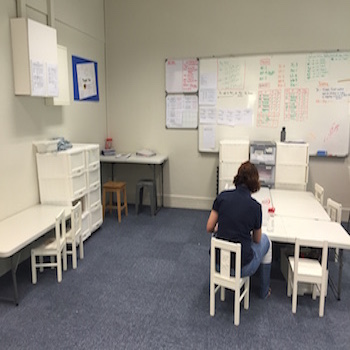
One of ABC’s therapists quietly preparing for the day’s lessons.
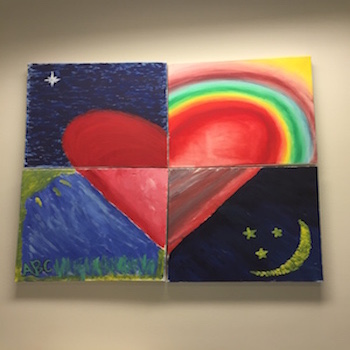
In one of ABC’s team building exercises, the teachers were asked to paint how they feel about their work for the children. This Heart painting is what they painted.


